Doing IT Differently - F: Conceptual Frameworks
What will be different at
HC in 2008?
F: Conceptual FrameworksThe shift in focus from information to
knowledge and understanding - and even wisdom - has emphasised the need to
highlight concepts, conceptual lenses and conceptual frameworks in curriculum design - as well as learning and teaching. (
eg see
Concept-Based Curriculum and Instruction by Erickson)
However, although
conceptual frameworks are used by educators in research and curriculum design they are not as often given to students to help them make their own connections.
Over the last few years a number of
colleagues have supplemented their teaching of the usual
topic or subject based concepts (
eg 'values', 'texture', 'evolution' or 'sustainability') with more
integrative frameworks such as
Senge's 'systems framework', Gardner's
'multiple intelligences framework' and
Wilber's 'four-quadrant framework'. The
response from students has been very positive.
 In 2008
In 2008 we plan to introduce integrative frameworks to computing students - particularly those doing interactive media involving Student Directed Inquiry (see
previous post). We will continue to use integrative
conceptual frameworks with students in English, Media and our academic achievement program.
Integrative conceptual frameworks help students to:
- move their thinking to the metacognitive level - thinking about thinking
- make sense of transdisciplinary inquiry - required in the Student Directed Inquiry course
- make connections to their existing knowledge and understanding
- know what they don't know - and know where to find out
- transfer learning to new situations - and cope with rapid change
- understand the importance of worldviews - and the need for collaborative inquiry
Exactly how we will use integrative conceptual concepts with computing students still needs to be worked out...
Previous - E: Assessment of, for and as Learning Next - F: Blended Learning
Labels: conceptual frameworks, integral, learning, metacognition, structure, teaching, transdisciplinary
Integrating Science and Soul in Education

My wife has just put her recently completed thesis online!
To quote from her abstract:
"This is an auto-ethnographic study into the lived experience of a science teacher as she attempts to transform her science teaching practice and the practice of other science teachers over a period of 15 years. In exploring what it means to be a holistic educator she is faced with disorienting dilemmas which cause her to question underpinning assumptions, values and curriculum frameworks which inform traditional science teaching practice and culture. In trying to reconcile science and soul in the pedagogical space of a physics classroom her journey requires a deep investigation of self in various cultures – science culture, educational culture, modernist and postmodernist cultures."
Phenomenal work!
Labels: conceptual frameworks, curriculum, holistic, integral, learning, spirituality, teaching, transdisciplinary, transformation
Designing Courses: Learning Areas and Capabilities
I've been playing with models that might clarify the process of designing courses in order to provide for
all students under the new Post Year 10 Curriculum Framework for Tasmania. I've also been reading about the
current call for a "back to basics" national curriculum and in particular thinking about
Alan Reid's proposal's in
Rethinking National Curriculum Collaboration - but within a State rather than national context.
(School education is the constitutional responsibility of the States in Australia.)Before the current PY10 Curriculum Framework was developed the structure of the curriculum was hard to conceptualise. In the late 80s and early 90s traditional subjects were loosely grouped into 'learning areas'; new programs to support literacy, numeracy and ICT literacy were developed; new courses emerged and some stayed; student support, health and well-being and career/pathway options evolved; key competencies/capabilities were identified...
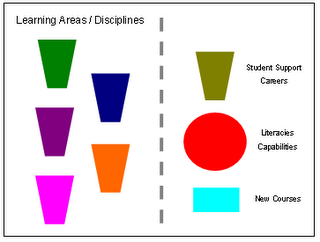
However much of this sat outside traditional subjects/leaning areas - conceptually and often in implementation as well - or sometimes uneasily within syllabuses and timetables as attempts were made to "embed them".
Syllabus development most often occurred within subject/learning areas and tended to reinforce existing knowledge structures, ways of learning, teaching and assessment. New courses often failed to gain a foothold if they did not fall neatly into traditional ways of organising knowledge.
The new PY10 Curriculum Framework is based on agreed values and purposes arrived at during a long period of co-construction. We are currently looking at the structures and processes that might inform the provision of courses within the Framework. What range of courses will be available to choose from?
While we now have a State Curriculum Framework individual year 11/12 schools will be responsible for implementation to meet student needs in local contexts. Which courses will schools choose to offer their students? And how will individual classroom teachers interpret these courses?
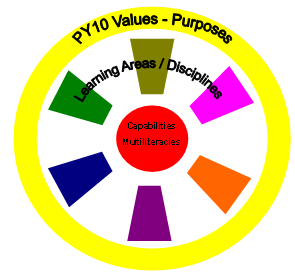
(NB In this graphic the number of learning areas is arbitrary.)
A key question at the moment is what sits between the values and purposes and the capabilities/literacies? What are the contexts for learning? Can we move away from learning areas? Should we move away from learning areas? Following Reid's suggestion (in the above paper) can we develop courses where students learn for the capabilities through the learning areas - leaving the details of what learning to schools, teachers and students?
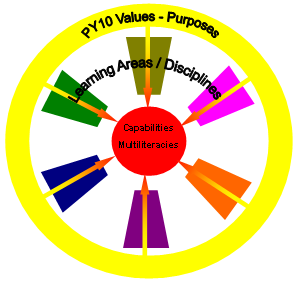
Or will existing ways organising knowledge/skills and their associated communities of practice work against providing opportunities to develop all the capabilities required for the 21st century? Will anything really change if traditional learning areas still dominate structures and processes for course/syllabus development.
And where do transdisciplinary approaches fit? How do we move beyond disciplines to engage in the kind of rigorous thinking that is needed to meet today's societal and planetary challenges? Can we construct valued learning experiences/courses that exist in the space between the disciplines and their well developed resources/support structures/dialogues?
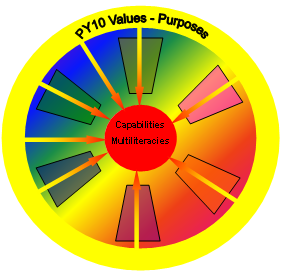
Perhaps we need to use other lenses/conceptual frameworks to help us create courses/learning experiences that help students to make meaningful connections beyond subject borders and to "know what they don’t know". Can we generate meaningful content/contexts by asking the big questions? Is an 'integral' lens useful as a conceptual framework?
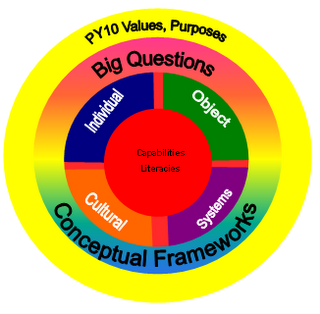
Perhaps course developers and classroom teachers (hopefully the same people) need to draw on a course development toolbox containing a variety of conceptual lenses... A learning ecology/connectivism framework such as the following by George Siemens that looks at "know where" as well as "know-how" and "know-what" might be one tool.
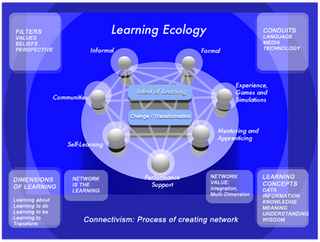
And how can we establish course developement models/principles that ensure the ongoing currency of courses in today's rapidly changing world?
Labels: 21stCentury, conceptual frameworks, curriculum, learning, literacies, transdisciplinary
Earth to Roger...
Photonics, Biomimetics, Nanotechnology, Robotics, Cryptography... These are the leading edge areas of science and mathematics that years 10-12 students and teachers study at a senior secondary school in South Australia.
I have just returned from the
International iNET Conference in Melbourne and my head is still somewhere on another planet! When I do come back to Earth I have decided that I need to go to the
Australian Science & Mathematics School (ASMS) in Adelaide.

In this school the students and teachers learn together about leading edge science and mathematics that is going to transform all our lives over the next 20 years (according to an Australian Government Report). Just briefly some features of the school are:
- Years 10-12 and teachers work together on interdisciplinary inquiry.
- Compulsory 'Central Studies' include study Mathematics and Abstract Thinking, Sustainable Futures, Nanotechnology, The Earth and Cosmos and Biotechnology.
- University modules to be studied include Robotics, ICT, Bioinformatics, The Politics of Energy and Electronics.
- Students go home at noon on Tuesdays so teachers can participate in professional inquiry and research with Flinders University.
- Year 12 students finish with Certificated Accreditation for University entrance.
According to ex-students now at university they are far better prepared for learning that students from other schools.
I wonder if all Tasmanian Colleges can teach science and mathematics in the same way? When I think back to my days at uni what I remember best is the work I did on leading edge science such as holograms - I still have the 3D holograms I made of chess pieces...
More on other conference sessions soon.
Labels: transdisciplinary












